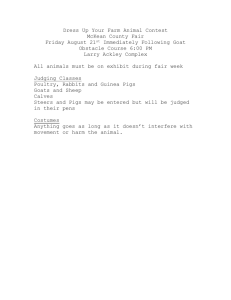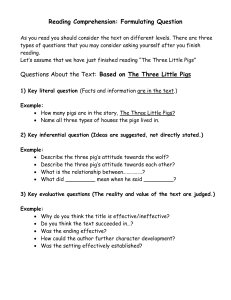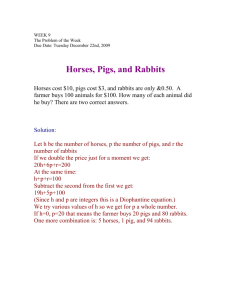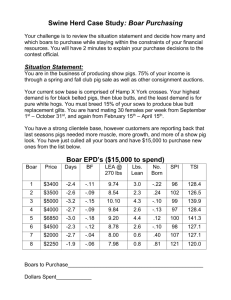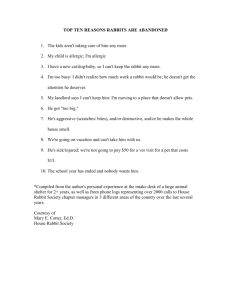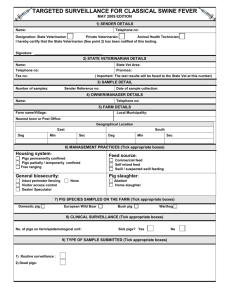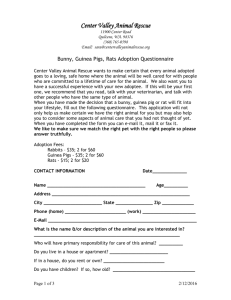ANS 4102 PIG AND RABBIT PRODUCTION SYSTEMS
advertisement
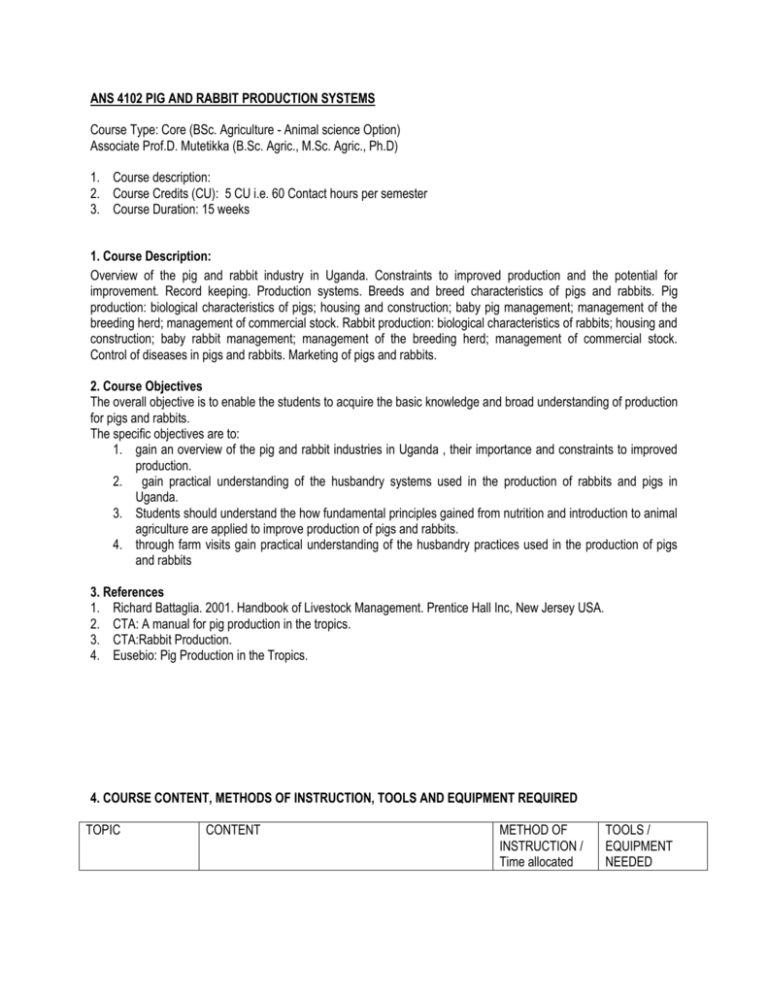
ANS 4102 PIG AND RABBIT PRODUCTION SYSTEMS Course Type: Core (BSc. Agriculture - Animal science Option) Associate Prof.D. Mutetikka (B.Sc. Agric., M.Sc. Agric., Ph.D) 1. Course description: 2. Course Credits (CU): 5 CU i.e. 60 Contact hours per semester 3. Course Duration: 15 weeks 1. Course Description: Overview of the pig and rabbit industry in Uganda. Constraints to improved production and the potential for improvement. Record keeping. Production systems. Breeds and breed characteristics of pigs and rabbits. Pig production: biological characteristics of pigs; housing and construction; baby pig management; management of the breeding herd; management of commercial stock. Rabbit production: biological characteristics of rabbits; housing and construction; baby rabbit management; management of the breeding herd; management of commercial stock. Control of diseases in pigs and rabbits. Marketing of pigs and rabbits. 2. Course Objectives The overall objective is to enable the students to acquire the basic knowledge and broad understanding of production for pigs and rabbits. The specific objectives are to: 1. gain an overview of the pig and rabbit industries in Uganda , their importance and constraints to improved production. 2. gain practical understanding of the husbandry systems used in the production of rabbits and pigs in Uganda. 3. Students should understand the how fundamental principles gained from nutrition and introduction to animal agriculture are applied to improve production of pigs and rabbits. 4. through farm visits gain practical understanding of the husbandry practices used in the production of pigs and rabbits 3. References 1. Richard Battaglia. 2001. Handbook of Livestock Management. Prentice Hall Inc, New Jersey USA. 2. CTA: A manual for pig production in the tropics. 3. CTA:Rabbit Production. 4. Eusebio: Pig Production in the Tropics. 4. COURSE CONTENT, METHODS OF INSTRUCTION, TOOLS AND EQUIPMENT REQUIRED TOPIC CONTENT METHOD OF INSTRUCTION / Time allocated TOOLS / EQUIPMENT NEEDED Current status Trend Potential and Opportunities Free ranging to scavenge for food. Tethered or confined in a backyard Commercial units (Small, medium or large Interactive lecture (2 hrs) Interactive lecture (3 hrs) Chalk / BB or Markers / Flip charts Interactive lecture (5 hrs) Chalk / BB or Markers / Flip charts Statutory regulations Purpose of production Location Land available Capital requirements Management Feed and health Gilts/sows: Bucks and Does Growth capacity Environmental Requirements Housing Intensive housing Semi-intensive housing Principles of housing in pigs/rabbits Preweaning and early postweaning Weaning Growing pigs (20-50 kg) Finishing Breeding pigs Drinking water requirements Factors to Consider in Pig/Rabbit Housing Constructions of Pig Buildings. Lecture (6 hrs) Practical (4 hrs) Chalk / BB or Markers / Flip charts Lecture (3 hr) Practical (2 hrs Chalk / BB or Markers / Flip charts 7. General management practices Management of baby pigs Management of weanling pigs Management of market pigs Management of breeding stock Lecture (8 hr) Practical (3 hrs 8. Breeds and breeding Breeds Breeding systems Selection of breeding stock Important characteristics to select for Artificial insemination Planning an annual breeding program Guidelines for Herd Health African swine fever Sarcoptic mange Mastitis-metritis-agalactiae syndrome Helminthosis Planning for the market Weaners Slaughter Pigs Improvements in the Marketing System Lecture (4 hr) Practical (4 hrs Chalk / BB or Markers / Flip charts/ LCD Lecture (2 hr) Practical (3 hrs Chalk / BB or Markers / Drugs/disinfectant s/deworming guns Lecture (2 hr) Chalk / BB or Markers / Flip charts 1. The pig and rabbit industry in Uganda 2. Production systems 3. Planning a pig/rabbit production unit 4. Production traits 5. Nutrition and Feeding Programs 6. Pig and rabbit housing 9.Health and Hygiene 10. Marketing Interactive lecture (4 hrs) Chalk / BB or Markers / Flip charts Chalk / BB or Markers / Flip charts General delivery Approach Lecturers covering the theory Field practicals and farm visits Case study reports Overall evaluation. Continuous assessment examinations Practical assignments University examinations 20% 20% 60%
